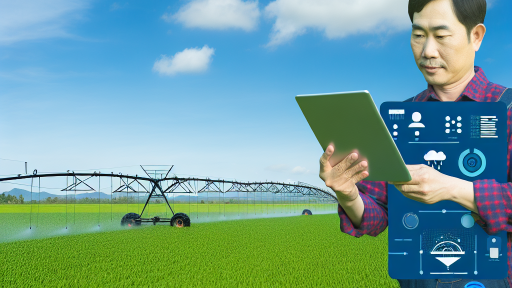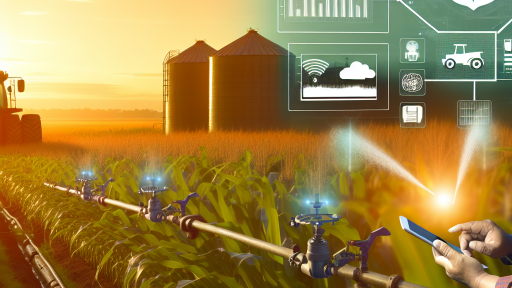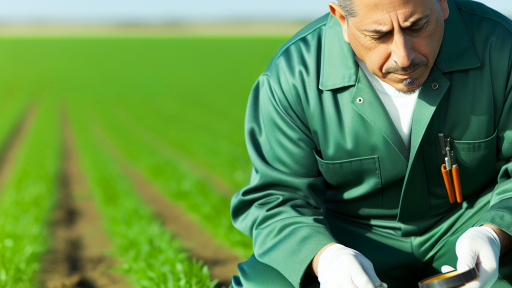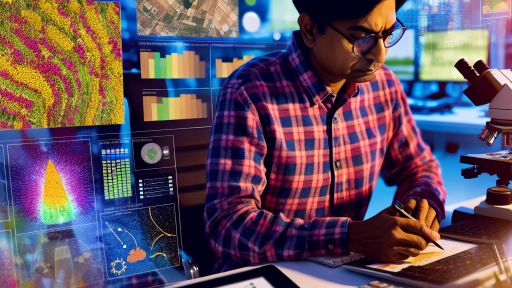Introduction to Smart Irrigation Systems and Precision Agriculture
Smart irrigation systems represent a significant advancement in agricultural practices.
These systems utilize technology to optimize water use in farming.
Farmers can now conserve water while ensuring crops receive adequate moisture.
With climate change and water scarcity, efficient irrigation becomes crucial.
Precision agriculture allows farmers to collect and analyze data effectively.
This data-driven approach enhances decision-making in farm management.
Integrating smart irrigation into precision agriculture offers numerous benefits.
Firstly, it improves crop yield through precise water application.
Farmers can reduce waste by delivering water only when necessary.
Secondly, it aids in reducing operational costs related to water usage.
Smart irrigation systems involve various technologies and components.
Sensors play a vital role in measuring soil moisture levels.
Moreover, these sensors can alert farmers when irrigation is required.
Automated systems can then initiate watering based on sensor data.
This automation minimizes labor costs and increases efficiency.
Transform Your Agribusiness
Unlock your farm's potential with expert advice tailored to your needs. Get actionable steps that drive real results.
Get StartedAdditionally, data analytics in smart irrigation helps in planning and forecasting.
Farmers can use historical data to determine optimal watering schedules.
Collectively, these advancements support sustainable farming practices.
Sustainable practices promote the health of ecosystems and agricultural resilience.
Smart irrigation systems integrate seamlessly into precision agriculture.
They offer solutions for water management necessary for modern farming.
Key Components of Smart Irrigation Systems
Automated Water Delivery
Automated systems deliver precise amounts of water to crops.
This technology uses sensors to monitor soil moisture levels.
As a result, irrigation occurs only when necessary.
Farmers conserve water and reduce costs effectively.
Soil Moisture Sensors
Soil moisture sensors play a vital role in smart irrigation.
These sensors provide real-time data on soil conditions.
Consequently, farmers can make informed decisions about watering.
Moreover, they promote optimal plant growth and yield.
Weather Forecast Integration
Integrating weather forecasts enhances irrigation efficiency.
Such systems adjust watering schedules based on predicted rainfall.
This proactive approach prevents over-watering and waste.
Additionally, it ensures crops receive adequate moisture during critical periods.
Drip Irrigation Technology
Drip irrigation is an important component of smart systems.
It delivers water directly to plant roots in small amounts.
This method reduces evaporation and runoff significantly.
Consequently, it helps to maintain soil structure and health.
Remote Monitoring and Control
Remote monitoring allows farmers to manage irrigation from anywhere.
Using mobile apps, they can adjust settings in real-time.
Showcase Your Farming Business
Publish your professional farming services profile on our blog for a one-time fee of $200 and reach a dedicated audience of farmers and agribusiness owners.
Publish Your ProfileThis flexibility ensures timely responses to changing conditions.
Moreover, it enhances overall farm management efficiency.
Data Analytics and Visualization
Data analytics transforms irrigation management through insights.
Farmers analyze historical and real-time data patterns.
Consequently, they improve decision-making regarding water usage.
Visualization tools present data in understandable formats.
Thus, they enable proactive adjustments to irrigation practices.
Benefits of Smart Irrigation for Crop Management
Improved Water Efficiency
Smart irrigation systems optimize water usage for agriculture.
They use data from soil moisture sensors to provide precise watering.
This method reduces waste and conserves water resources effectively.
Enhanced Crop Health
Consistent watering promotes uniform growth in crops.
Smart irrigation ensures plants receive the right amount of moisture.
Healthy plants resist pests and diseases better than stressed ones.
Cost Savings
Farmers benefit financially from reduced water usage.
Lower water bills directly improve profitability for growers.
Additionally, smart systems minimize labor costs through automation.
Data-Driven Decision Making
Smart irrigation systems integrate data analytics for informed choices.
Farmers can monitor real-time conditions and adjust accordingly.
This ability enables proactive management of crop needs.
Environmental Sustainability
By conserving water, smart irrigation aids in environmental protection.
It reduces runoff, which helps maintain local ecosystems.
Moreover, less water usage leads to lower energy consumption.
Delve into the Subject: Real-Time Crop Monitoring with Advanced Sensors
Technologies Used in Smart Irrigation
Internet of Things (IoT)
IoT connects various devices to monitor irrigation systems effectively.
Farmers can access real-time data from their fields remotely.
This connectivity allows for immediate adjustments based on environmental conditions.
Moreover, IoT enhances resource management through improved data analytics.
Sensors in Smart Irrigation
Sensors play a crucial role in smart irrigation systems.
They measure soil moisture levels and weather conditions accurately.
For instance, moisture sensors inform farmers when to irrigate.
In addition, weather sensors detect rainfall, reducing unnecessary water usage.
Integrating these sensors creates a more responsive irrigation approach.
Artificial Intelligence (AI)
AI algorithms analyze vast amounts of agricultural data.
This analysis helps in predicting optimal watering times.
Farmers benefit from tailored irrigation schedules using AI insights.
Furthermore, AI systems can identify potential irrigation issues before they escalate.
Ultimately, AI contributes to more efficient and sustainable farming practices.
Find Out More: Installing Smart Irrigation: Tips for Farmers
Case Studies of Successful Smart Irrigation Implementations
Innovative Solutions at Green Fields Farm
Green Fields Farm implemented a smart irrigation system in 2021.
They integrated soil moisture sensors to optimize water usage.
Showcase Your Farming Business
Publish your professional farming services profile on our blog for a one-time fee of $200 and reach a dedicated audience of farmers and agribusiness owners.
Publish Your ProfileThis approach significantly reduced water waste and improved crop yields.
Farm manager Sarah Mitchell reported a 30% decrease in water consumption.
Additionally, the farm noticed healthier plants and more consistent growth.
Consequently, the farm’s profits increased due to lower operational costs.
WaterWise Technologies in Action
WaterWise Technologies partnered with Valley View Orchards in 2020.
They installed a state-of-the-art drip irrigation system connected to weather stations.
This system facilitated precise watering schedules based on real-time data.
As a result, Valley View Orchards experienced a 40% reduction in irrigation costs.
Moreover, this strategy enhanced fruit quality substantially.
Farm owner Tom Reynolds praised the solution’s efficiency and reliability.
Success Story of Hillside Vineyards
Hillside Vineyards adopted smart irrigation technology in 2022.
They utilized advanced analytics to predict irrigation needs based on vine growth stages.
This method ensured tailored water delivery throughout the growing season.
The vineyard reported a remarkable 25% increase in grape production.
Furthermore, the quality of the grapes improved, leading to premium wine sales.
Owner Emily Johnson highlighted the strategic advantage gained through technology.
Collaboration with Local Research Institutions
Agricultural Institute collaborated with farmers across Riverside County.
They conducted trials using smart irrigation systems over multiple growing seasons.
Data gathered revealed significant improvements in crop health and yield efficiency.
Farmers who participated observed an average of 35% better water usage.
Moreover, they received guidance on selecting optimal irrigation schedules.
This initiative received recognition for promoting sustainable farming practices.
See Related Content: Integrated Vertical Farming Systems for Sustainable Agriculture
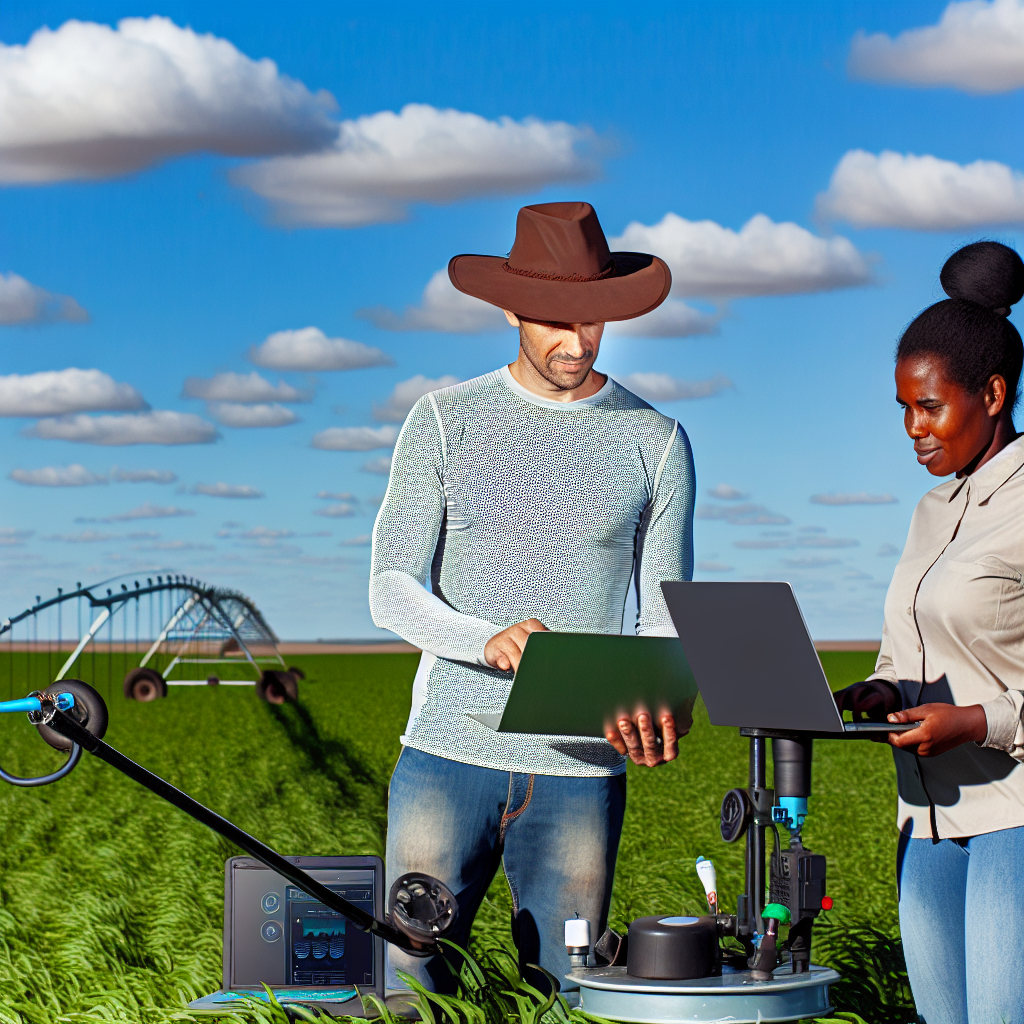
Challenges and Limitations of Smart Irrigation Systems
High Initial Costs
Implementing smart irrigation systems often requires significant upfront investment.
Farmers may struggle to find suitable financing options.
Additionally, the price of technology can deter adoption.
Technological Complexity
Smart irrigation systems often involve complex technology.
Users may face steep learning curves when operating new systems.
This complexity can lead to user frustration.
Moreover, maintaining and troubleshooting these systems can be challenging.
Dependence on Weather Conditions
Smart irrigation systems depend heavily on accurate weather data.
Inaccurate data can lead to poor irrigation decisions.
This reliance may limit the reliability of irrigation schedules.
Consequently, crop yields could suffer due to wrong timing.
Variable Soil Conditions
Soil conditions vary widely across agricultural lands.
Smart systems may not always adjust adequately to these variations.
This inconsistency can reduce irrigation efficiency.
Farmers need to monitor soil conditions closely to optimize water usage.
Maintenance and Repair Needs
Regular maintenance is crucial for smart irrigation systems.
Delayed repairs can cause system failures.
Showcase Your Farming Business
Publish your professional farming services profile on our blog for a one-time fee of $200 and reach a dedicated audience of farmers and agribusiness owners.
Publish Your ProfileFarmers may not always have immediate access to technical support.
This can lead to prolonged downtimes during critical growing periods.
Data Privacy Concerns
Using smart technologies raises data privacy issues.
Farmers may worry about unauthorized access to their data.
Furthermore, sharing data with third parties can be a concern.
Thus, establishing data security protocols is essential.
Uncover the Details: Enhancing Soil Health Through Data Insights
Future Trends in Smart Irrigation Technology
Increasing Automation and AI Integration
The future of smart irrigation focuses on automation and artificial intelligence.
Farmers will utilize AI to analyze data and make informed irrigation decisions.
This technology will optimize water usage and enhance crop yields.
Moreover, automated systems will reduce labor costs significantly.
Enhanced Sensor Technology
Developments in sensor technology will revolutionize smart irrigation.
New sensors will monitor soil moisture, temperature, and crop health more accurately.
This information will enable precise irrigation based on real-time data.
Consequently, farmers can reduce water waste and improve efficiency.
Integration with Weather Forecasting
Smart irrigation systems will increasingly integrate with weather forecasting tools.
This integration will provide valuable insights for scheduling irrigation effectively.
Farmers will adjust watering times based on predicted rainfall and temperature shifts.
Ultimately, this approach will conserve water and help prevent over-irrigation.
Sustainable Practices and Compliance
The push for sustainability will drive innovation in irrigation technology.
Farmers will adopt practices that comply with environmental regulations.
Smart systems will provide data on water usage, promoting accountability.
As a result, farms will become more environmentally friendly and efficient.
Consumer Demand for Water-Conserving Crops
Consumer preferences will shape the future landscape of agriculture.
Demand for water-efficient crops will increase as resources dwindle.
Smart irrigation technology will facilitate the cultivation of these crops.
This trend will align agricultural practices with market expectations.
Innovative Financing and Support Models
Financial models for smart irrigation systems will evolve to support farmers.
New funding opportunities will incentivize the adoption of modern technologies.
Additionally, government and private organizations will provide resources and training.
This support will encourage widespread implementation across diverse agricultural sectors.
Integrating Smart Irrigation with Other Precision Agriculture Practices
Enhancing Crop Health
Smart irrigation systems play a crucial role in enhancing crop health.
They provide the exact amount of water that crops need.
This precision helps prevent both overwatering and underwatering.
Healthy crops have better resilience to pests and diseases.
Additionally, optimized water usage promotes better growth rates.
Coordination with Soil Sensors
Soil sensors provide data on soil moisture levels.
Integrating these sensors with smart irrigation systems is beneficial.
This collaboration ensures timely and adequate watering.
Moreover, it reduces water wastage significantly.
Showcase Your Farming Business
Publish your professional farming services profile on our blog for a one-time fee of $200 and reach a dedicated audience of farmers and agribusiness owners.
Publish Your ProfileFarmers can make informed decisions based on real-time data.
Utilizing Weather Data
Weather data integration enhances the effectiveness of irrigation systems.
This integration allows adjustments based on rainfall forecasts.
Farmers can schedule irrigation when conditions are optimal.
Consequently, this reduces the risk of crop stress.
Furthermore, it conserves water resources effectively.
Combining with Nutrient Management
Smart irrigation systems can also be paired with nutrient management.
Proper irrigation allows for better nutrient uptake by plants.
This pairing maximizes the effectiveness of fertilizers used.
Optimizing both water and nutrients can lead to increased yields.
Farmers can achieve higher profitability through this integration.
Monitoring and Data Analytics
Continuous monitoring is a key advantage of smart irrigation.
Data analytics helps farmers track irrigation performance over time.
Farmers gain insights into their water usage patterns.
These insights lead to optimized irrigation schedules.
Ultimately, this reduces operational costs for farmers.
Collaboration with Technology Providers
Partnering with technology providers enhances the efficacy of irrigation systems.
These providers offer advanced solutions for monitoring and control.
Farmers can benefit from ongoing support and updates.
Collaboration can lead to customized strategies for specific farms.
Such tailored solutions improve overall agricultural productivity.
Additional Resources
Precision Agriculture for Crop and Livestock Farming—Brief Review …
An overview of smart irrigation systems using IoT – ScienceDirect

